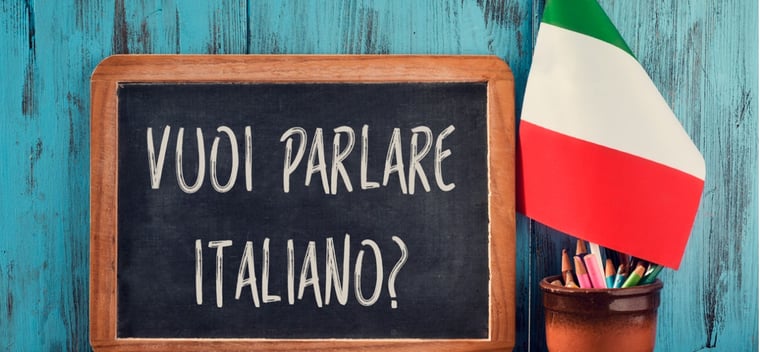8 Key Considerations for Choosing an Italian Translation Partner

Whether you're just starting to explore translation services or thinking about switching from your existing Language Services Provider (LSP), we understand that the process can be quite daunting.
Now that you're targeting the Italian market, it's paramount to ensure your translations are precise and trustworthy. Remember, communicating clearly and with cultural insight is vital for success in any market.
Here at LinguaLinx, we've been in the translation industry for over 20 years, helping businesses bridge communication gaps. Having facilitated translations into more than 200 languages, we've encountered and surmounted a myriad of challenges — and learned a lot along the way. This experience grants us a unique perspective on the Italian market and its nuances.
So, how do you choose an LSP that not only meets but exceeds your expectations? What should you consider to ensure that your Italian translations stand out in quality?
Does your LSP have a deep understanding of not just the Italian language, but also the regional variations from Lombardia to Sicilia? Are they attuned to the nuances between standard Italian and local dialects, such as Neapolitan or Venetian?
Do their methods account for Italian business customs and practices? This ensures effective communication and adaptability. Additionally, can they adjust their services for different needs? For example, creating messages that connect with both urban audiences in Milan and rural communities in Tuscany.
By diving into these questions, you'll get a clearer picture of what high-quality Italian translation services look like. It will help you determine if your current translation service truly understands the depth and breadth of the Italian landscape. If not, you might benefit from seeking an alternative.
As we navigate this path, the goal remains clear: to ensure you translate not only words but also intentions and emotions. Doing so will secure your unwavering success in the diverse and dynamic Italian market.
What to Look for in an Italian Translation Service Provider
1. Mastery of the Right Italian Dialect
Are you translating for a client in Rome who speaks Standard Italian? Or maybe you're forging a business deal in Sicily, requiring translations in Sicilian dialect?
Like many languages, Italian has numerous dialects. Pinpointing the exact count is challenging, but it's undeniable that these dialects differ significantly. These include:
- Language – The foundation upon which all variants are based.
- Dialect – Regional variations in vocabulary, though the grammar is largely consistent.
- Variant – Specific versions used in distinct regions or communities.
You'll want an LSP capable of crafting a localization strategy that addresses these variations, setting you on the right trajectory.
2. Industry Experience
To truly succeed in a foreign market like Italy, understanding the language isn't enough. It's equally important to know the specific jargon and customs of your business area. Each industry has its own set of words, rules, and cultural nuances. These aren't just technicalities; they're the backbone of effective communication.
When you're looking for a translation partner, pick one that's not only fluent in Italian but also in the language of your business. It's about more than standard translations. The best services understand the unique words your industry uses, what your customers expect, and how businesses in your field talk to one another.
Choose a translation partner with a strong reputation in your industry. They'll be equipped to handle the distinct language and cultural aspects of your business. This hands-on industry knowledge is essential for making genuine connections with your Italian audience.
3. Review their Qualifications
When evaluating a Language Services Provider (LSP), qualifications should be a top priority. Reputable LSPs often hold multiple international certifications, highlighting their commitment to maintaining high translation standards and quality management.
Among these, ISO 17100 and ISO 9001 are crucial certifications to look for. ISO 17100 ensures that the LSP meets strict guidelines for translator qualifications, project management, and customer service, making it a global standard for translation excellence.
ISO 9001, on the other hand, focuses on quality management systems, ensuring that the LSP follows rigorous processes to deliver consistent, high-quality services across all projects.
Both certifications require regular independent audits, verifying the LSP’s adherence to their own processes and strict Quality Assurance (QA) guidelines. This ongoing evaluation ensures the provider continually improves and maintains high standards, giving you confidence in their ability to deliver accurate and reliable translations.
4.Understanding Their Workflow, Team, & Flexibility
If you're thinking about working with a translation service for a long time, it's crucial to understand how they operate. Here are some simple questions to guide you:
- Do they have clear and effective ways of working?
- Can they change their methods if your needs are different?
In the world of translation, no two projects are exactly the same. So, it's essential for a translation service to be flexible. They should be able to handle various situations and still give you top-quality translations.
Also, consider their team. Who will be working on your projects? A strong team means they can tackle any challenge, understand your specific needs, and deliver results that are just right for you.
In short, pick a service that's adaptable and puts your needs at the forefront. They should be ready to work with you in the best way possible.
5. Scalability And Turnaround
In the world of business, being able to change and grow is incredibly important. Imagine you have a big website about finance, and you need it translated into different Italian styles of speaking quickly.
Or maybe you have a small pamphlet that needs translating. Whether it's a large or small project, your translation service should be ready to handle it.
It's all about being able to handle more work when needed and delivering it fast without losing any of the quality. It's like having a car that can speed up when you need it and still run smoothly!
6. Translation Proficiency in Other Languages
As your business grows, you'll inevitably explore beyond the Italian-speaking market. In our world that's so connected, language shouldn't hold back your big plans.
So, when you're looking for a service to help with Italian translations, it's smart to also check if they can help with other languages. It's like planning ahead for a trip around the world!
Picking a translation team that knows many languages is super helpful. It means you won't have to start from scratch every time you enter a new market. Plus, you'll have the same trusty team helping you communicate everywhere you go.
This makes things easier and more consistent for your business. With a team that's skilled in many languages, you can step into new places knowing they've got your back. It's a smooth way to keep your brand's voice sounding just right, no matter the language.
7. Desktop Publishing Skills
Italian, just like other Romance languages, has its own special features. Translating from English to Italian might make the text about 15-30% longer. That's something to think about!
When you're working on a translation project, it's handy if one team can do everything. So, make sure your translation team is also good at desktop publishing tasks.
8. Check Their Past Italian Translations
When considering a translation service, it's essential to see some examples of their Italian translations. Don't simply rely on a test piece they do just for you.
There's a chance they might show you their very best work initially, but then assign a different, possibly less skilled team when the real project begins. Instead, ask to see actual work they've completed for other clients.
Checking out their past projects not only gives you a glimpse of their quality but also offers insight into their consistency, attention to detail, and overall approach.
Understanding how they've handled previous tasks can help you set the right expectations and ensure that you're making a well-informed decision. By doing your homework, you increase the likelihood of a successful partnership.
Get A Quote For Your English To Italian Translation
We’ve covered the key considerations for choosing a reliable Italian translation partner, from mastering regional dialects to ensuring industry-specific expertise and flexibility. These factors are crucial to ensuring that your translations are accurate, culturally appropriate, and tailored to your audience.
At LinguaLinx, we’re equipped to meet all of your translation needs. With ISO 17100 and ISO 9001 certifications, over 20 years of experience, and a commitment to excellence, we deliver high-quality, professional translations that help your business thrive in the Italian market and beyond.
Contact us today for a free, no-obligation consultation. Let LinguaLinx be your trusted partner for seamless Italian translations that ensure your message is clear and effective across all regions.






